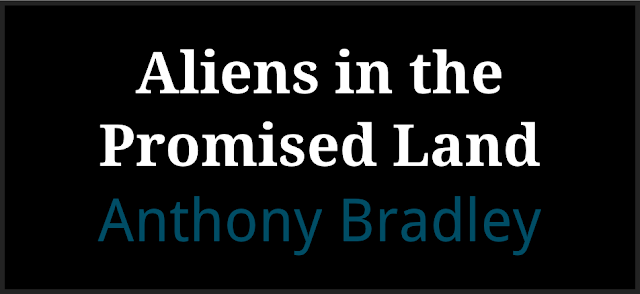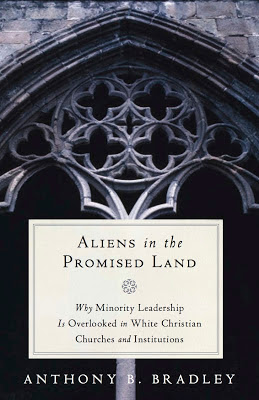4 out of 5 Stars
Author: Anthony Bradley
Publisher: P&R Publishing
Buy Aliens in the Promised Land
Reading Level: Moderate
Anthony Bradley has collected diverse voices to encourage, admonish, and instruct conservative evangelicals. We need diversity within the church and its seminaries. Bradley says,
This book represents my ongoing struggle to make sense of why evangelicalism struggles with diversity in church leadership and in the Christian academy. (p. 14)The writing is a mixture of experiential knowledge and constructive criticism (used in the best possible sense). Especially penetrating was the observation that the evangelical stress on right doctrine hasn’t always lead to “ethical emphases that resonated with” other cultures (p. 79). As a matter of fact, evangelicals over the last sixty to seventy years have purposeful shied away from ethical concerns for fear of falling prey to the “social gospel.”
Also, I found the diverse voices challenged my own point of view and revealed blind spots in my own thinking. Harold Dean Trulear points out,
The evangelical struggle with race does not always reflect overt racism. Often the culprit is a form of benign neglect—an inability to see the particularity of white evangelical culture and its captivity to middle-class American norms. (p. 96)His point boils down to this: white evangelicals haven’t loved Christians from different cultures well. We’ve merged white culture with evangelicalism. We expect others to integrate into our churches without thought to their perspective or culture.
I loved the re-focusing from racial reconciliation to solidarity. Solidarity starts at the beginning with God creating us all in his image. It provides a foundation when reconciliation is necessary. Bradley explains,
But I am convinced that the church will be able to lead society on race only if it moves beyond reconciliation and pursues racial solidarity, which means embracing our common human dignity (Gen. 1:26-28) as a human family in ways that celebrate and respect differences between ethnic communities for the common good. This goes beyond the failed concept of “color blindness” and recognizes the importance of racial, ethnic, and ideological differences as a catalyst for loving our neighbors well (Matt. 22:36-40; John 17). (p. 152)Bradley seems largely unconvinced of the need for any reconciliation (p. 152) but it too is part of the gospel story that needs to be taught. Preached without the emphasis of solidarity first and it may fall victim to the pitfalls explored by Bradley (pp. 152-57) but that doesn’t have to be the case when solidarity (Imago Deo) is the bedrock.
I walked away with deepening appreciate for people with different cultures than my own and their struggles. I also want to encourage pastors and leaders within the church to read this book and ask, “How can my church encourage diversity (not just tokenism) within its leadership and seminary?” If change happens, it will start from the pulpit.
Disclosure of Material Connection: I received Aliens in the Promised Land free from P&R Publishing. I was not required to write a positive review. The opinions I have expressed are my own. I am disclosing this in accordance with the Federal Trade Commission’s 16 CFR, Part 255: “Guides Concerning the Use of Endorsements and Testimonials in Advertising.”
If you plan on purchasing Aliens in the Promised Land, consider supporting Grace for Sinners by purchasing from Amazon.



No comments:
Post a Comment